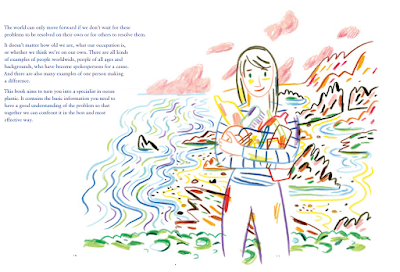"The study concluded that every year, about
9 million tons (8 million metric tons) of plastics
end up in the oceans. Almost all of it is packaging!
This is equivalent to about 1,000 tons (900 metric tons)
of plastic being dumped into the sea every hour.
Every single minute, that's a truckload full of plastic,
without stopping."
I have read a number of nonfiction books about the plastics found in our oceans today. Although I feel that I have gathered a lot of information through that reading, I was totally captivated by the story told by Ana Pego. She is a marine biologist; she has been gathering every type of plastic found on seashores around the world for many years. In 2015, she decided to name what she had been finding ... she calls it Plasticus maritimus.
The plastics found in the oceans today are a threat to our world. Writing the text with Isabel Minhos Martins allows a first-person narrative that is presented in a clear and comprehensive way for readers. In the first chapter Ms. Pego explains why the oceans are of such importance. In following chapters, she presents a 'field guide' to the many types of plastics identified, and some that have not yet been. She describes how these plastics are made, how we use them, and what happens to them when we throw them out.
She includes photos and descriptions of the many types of plastics, and adds thumbnail photos of many of the familiar plastics that have been picked up by beach searchers. Creating a network of people who work hard to clear and clean beaches, many of the plastics found have never been identified. On one page she includes a series of photos asking for help in figuring out what they are.
I appreciate that there is an extensive section to help readers keep the many types of plastics in common use in homes out of the landfills and oceans. She encourages readers to rethink, refuse, reduce, repair, reuse, and recycle. Recycling should be a last resort, since there are so many problems with recycling efforts. These difficulties are shared before the book closes with photos and much additional information in the book's back matter. Readers wanting to know more will find help there.
Readers are also invited to follow Ana on her Facebook page:
https://www.facebook.com/plasticusmaritimus/













No comments:
Post a Comment